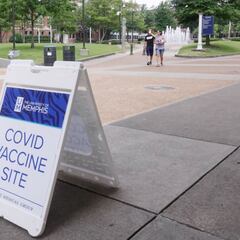What is the Candida auris 'superbug' fungal infection spreading in the US? What are the symptoms?
A fungal infection indentified in patients in hospitals and nursing homes has proved resistant to all known treatments and appears to be spreading.


Health officials have confirmed that there are increasing numbers of cases of a potentially deadly fungal infection spreading in some hospitals and nursing homes in the United States.
Outbreaks of Candida auris, an emerging yeast infection, were first identified in 2009 but the most recent batches of cases suggest that it is able to transmit from person-to-person for the first time. Although the risk of infection is relatively low, the fungal infection has proved resistant to all existing treatments.
Dr Meghan Lyman, a medical officer at the Centers for Disease Control and Prevention (CDC), said of the new findings: “This is really the first time we’ve started seeing clustering of resistance.”
What are the symptoms of Candida auris?
The infection, also known as C. auris, has been dubbed “a serious global health threat" by the CDC and can cause severe illness in the most extreme cases. It is commonly spread in healthcare settings when patients come into contact with contaminated surfaces or equipment, but the most recent cases show it can also spread between patients.
Candida auris is a fungus that spreads easily and can cause dangerous infections. New evidence is emerging that cases of C. auris resistant to all classes of antifungal drugs are spreading in health care settings. Read the report: https://t.co/olhWJZM4r5. #Cauris pic.twitter.com/1MgMSLsKyc
— CDC (@CDCgov) July 23, 2021
Because it is primarily found amongst hospitalised patients it is almost always seen in people who are also suffering other medical conditions, making it difficult to identify symptoms for C. auris. However the most common complaints amongst sufferers are fever and chills which do not respond to treatment by antibiotics.
In 2019 doctors in New York diagnosed three cases of C. auris which were also resistant to a class of drugs called achinocandins, typically considered the most effect treatment against fungal infections of this kind.
What can be done to combat the spread of C. auris?
Although the prospect of a treatment-resistant fungal infection sounds like something from a horror movie, healthcare professionals advise that the risk to the public is incredibly small. Amesh A. Adalja, M.D., senior scholar at the Johns Hopkins Center for Health Security, said that it is “really unable to cause severe disease in healthy individuals.”
Candida auris, unknown to medicine until about 15 years ago, may be the first fungus to breach human thermal defenses as a result of global warming. As the planet heats, fungi adapt and some may then be able to grow at 37 C. https://t.co/cpmqzv0JcHhttps://t.co/vev68ylvCi
— Arturo Casadevall (@ACasadevall1) July 24, 2021
Related stories
However he adds that the latest findings "underscore the need to be very proactive when it comes to emerging infectious disease threats and to have a robust pipeline for new anti-microbial agents."
In their own report on C. auris, the CDC said: “Surveillance, public health reporting, and infection control measures are critical to containing further spread.”

